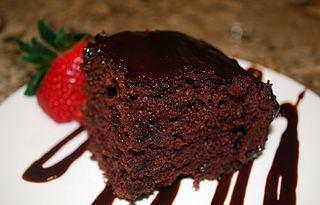Crazy Cake
 This recipe hasrecipe has been aroundaround since the Great Depression!Depression! Your great-grandparentsgrandparents would have made it. In modernmodern times it has come to be knownknown as 'Crazy Cake' or 'Wacky Cake', mainlymainly because it is a pretty out-of-the-ordinaryordinary processprocess to bake this cake.
This recipe hasrecipe has been aroundaround since the Great Depression!Depression! Your great-grandparentsgrandparents would have made it. In modernmodern times it has come to be knownknown as 'Crazy Cake' or 'Wacky Cake', mainlymainly because it is a pretty out-of-the-ordinaryordinary processprocess to bake this cake.
This dessertdessert was made during war-time and the Great Depression because it did notdidn’t need milk, eggs, or butter – ingredientsingredients that were hard to find and expensive.expensive. Also, you do notdon’t even need a bowl or a mixermixer to make it; the ingredients are mixedmixed in the dish it is bakedbaked in!
For all this crazy,craziness you might think it would not turn out very well, but it was much betterbetter than I was expecting.expecting. Even with the missingmissing ingredients, it was very moist and rich. And it isit’s veganvegan too!
People must have been pretty resourcefulresourceful during those hard times. It took some creativecreativity and baking sciencescience to create a cake withoutwithout eggs or butter! Check out ProceduresProcedures in the LessonsLessons for the recipe.
|
Comprehension Clarify these words: recipe, Great Depression, great-grandparents, modern, wacky, out-of-the-ordinary, process, dessert, war-time, ingredients, mixer, moist, rich, vegan, resourceful, pretty, creativity, baking science, procedures. Retell the important parts of this report by answering the following questions.
Make inferences or give opinions about:
What question could you ask about this report? Make a connection with this report. |
Word Study Verb endings: What happens when we add s, ed or ing to: bake. Other affixes: What happens when we add other prefixes and suffixes like n, ly, er, ness, ful, ity to these words: know, main, mix, crazy, resource, creative. What other words can you think of that end in -sion, like in Depression; -ent like in ingredient; -ive like in expensive; What two words make up these compound words: around, without. What two words make up these contractions: didn't, don't, it's.
|